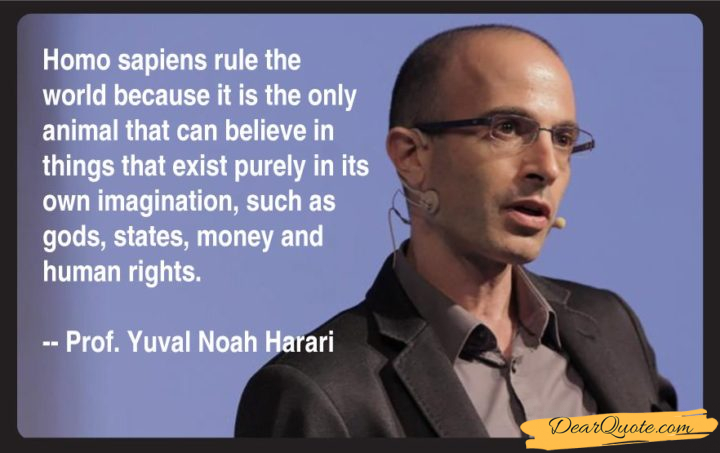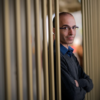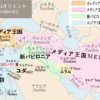【ユヴァル・ハラリ氏講義】日英対訳で読むしあわせの歴史(前編)
ユヴァル・ノア・ハラリ氏のオンライン歴史講義 “A Breif History of Humankind” を紹介する。
講義全体はLesson 01~Lesson 17で構成されており、内容は書籍『サピエンス全史』とほぼ同じ。各レッスンは1時間以上あるから、全体を視聴するには相当の体力・気力・時間が必要。ただノンネイティブの英語の聞き取り練習にはうってつけ(ヘブライ語訛り?)。

今回から2回に分けて、全体の肝となると思われる、Lesson 16終結部で語られている「幸福論」をお届けする。これを選んだのには理由がある。
ハラリ氏の隠れたメッセージ?
紹介するLesson 16のテーマはしあわせだ。ここだけは、他の巨視的・客観的な歴史記述と少し趣きが違う。少しパーソナルな感じがある。そこが面白いと思った。
虚構の共有⇒社会化⇒分散発展⇒統合⇒知の外部化
ハラリ氏の歴史観を強引にひとことにまとめれば、人類史とは見知らぬ者同士の間で想像された秩序・現実(imagined order/reality)を共有して社会を生み出し、そのパワーを通じて生物界の王にのし上がったプロセスだ。
- 最大の出来事は太古の認知革命(Cognitive Revolution)だった。これによって相対的弱者に過ぎなかったホモサピエンスは、大型の野獣や、ネアンデルタールなど並みいるライバル人類(?)を競り落とした。
- 人類は認知革命で得た虚を操る言語(fictive language)を駆使して、現実界には存在しないもの(ストーリー、神、貨幣、国など)を脳内で創造した。しかも、家族などの限られた群れを超えて、それを無数の他者と共有することで社会(共同体⇒国家⇒王国⇒帝国)を形成するや、人類は地球全体に拡散していった。
- その後、いわゆる文明を生むと農業革命⇒科学革命⇒産業革命といくつもの段階を経て進化したが、その大きな流れは拡散の結果分断されていた文明の再統合(unification of humanity)に向かっている収束しつつある。現代は法と貨幣を基軸にした資本主義世界だが、それも過程のひとつに過ぎない。
- 将来、ホモサピエンスは己の知を外部化(非生物化)し、代替的知性体(AI、ハラリ用語ではホモデウス)を創造する方向に進みそうだ。
内部世界の見えないエンジン
人類史に一貫する虚構を共有するパワーは、もとを辿れば人間個々の内部世界に由来する。注目されるのは、人間の内面で何が起こっているのかである。どうも人間の内部には人間を駆り立て文明を前進させる見えないエンジンがあるらしいが、それはしあわせという概念と切り離せないようなのだ。
ハラリ氏は、いみじくもLesson 16の冒頭で、しあわせは徹頭徹尾「主観的なもの」だと、科学者たちの最新コンセンサスを紹介している。
しあわせの科学的定義
Now the generally accepted definition of happiness as studied today by social and life scientists is that happiness is subjective well-being. This is the professional term for happiness-subjective well-being. According to this definition happiness is something that I feel inside myself. It is either a sense of immediate pleasure or a sense, a feeling of long-term contentment with the way that my life is going.
現代の社会科学や生命科学の研究者が合意している、しあわせの定義は「主観的な安寧」というものです。「主観的な安寧」、これが科学のプロによるしあわせの定義なのです。この定義に従えば、しあわせとは人が内面に感じる何かです。それは感覚的な快感かもしれないし、もっと長期にわたる、自分の人生のありかたに関する満足感かもしれません。
しあわせとは何か?
以上で前置きを終え、本編に入ろう。
Aldous Huxley’s novel “Brave New World” which describes a world ruled with the help of psychiatric drugs everyone in this world is very happy all the time because everyone takes drugs all the time. Most readers feel there is something very wrong with that kind of world, but it is hard to say exactly what because everyone is so happy. What’s wrong with it?
オルダス・ハクスレイの小説『素晴らしい新世界』では、世界中の人間がしょっちゅう向精神薬を服用しています。そのおかげでみんないつでもハッピーなのです。読者の多くはそんな世界はどこか間違っていると感じるのですが、全員がしあわせを感じているというので、どこがいけないのか指摘できません。実際、どこが間違っているのでしょうか?
The problem has to do with a definition of happiness in Huxley’s world. Happiness is defined in biological terms, simply as pleasure-to be happy is no more and no less to experience pleasant bodily sensations more and more of the time. Since all normal biochemistry, normal biochemical system limits the volume and the duration of these pleasant sensations in the body, the only way to make people experience a high level of happiness over an extended period of time is to manipulate the biochemical system with the help of drugs and other medical treatments. This indeed is a direction in which our world today is progressing not in some fiction or fantasy but in the real world. And it’s progressing in that direction in a very fast rate.
問題は、ハクスレイの描いた世界においけるしあわせの定義にありそうです。しあわせが生物学的な快楽と―身体器官ができるだけ長い間快感を覚えること―と同義になっているのです。人間の生化学システムは、何も手を加えなければ、身体的快感の量と持続時間に制限を設けています。少しでも長く快感を味わおうと思えば、薬や医学的な助けを借りるしかありません。これは絵空事ではなく、現代社会では実際問題、薬の助けを借りて快感を増やす方向に動き出しています。しかも急速なペースで。
しあわせの研究
But the definition of happiness as pleasure which is common today in science and in our society is not accepted by all scholars or by all people. In a very famous study, Daniel Kahneman, winner of the Nobel Prize for economics, studied amongst other things what causes people happiness. He asked people to recount a typical workday, a usual day, and to tell what happened to them on that day in great details, going through episode by episode, and evaluating how much they enjoyed or disliked each of them. He did one of these studies on 900 and something women in Texas from working class.(中略)
「快楽がしあわせ」という定義は社会的にも科学者の間でもふつうに受け入れられていますが、なかにはそう考えない学者や人々がいます。ノーベル経済学賞を受賞したダニエル・カーネマンが行った有名な調査があります。その調査にはしあわせについての調査も含まれていました。カーネマンは回答者の一人ひとりに、平日の、ふつうの一日に起きたことを事細かに思い出してもらい、彼らがそれを楽しんだか、イヤに思ったかを尋ねました。調査のひとつに、テキサスの中流家庭の900人ほどの女性を対象にしたものがありました。(中略)
子育ては不快の連続
What turned out is that the things, the episode that these women, on average, disliked most, or some of the things that they disliked most, was the taking care of their children. Most of their contact, most of their activities which were concerned with their children were rated as the least joyful activities of the day-like changing diapers, doing the washings of the dirty clothes, preparing food for them, and having to deal with temper tantrums and children fighting and yelling at each other. This was the least enjoyable part of everyday. They even preferred, according to the grades they gave, they even find more joy at work, than being with their children at home.
この調査でわかったのは、概して、女性たちがいちばん嫌いなのは子どもの世話だということです。オムツ替え、子どもの汚した服の洗濯、食器洗い、食事の準備、かんしゃくを爆発させた子どものあやし、わめいたり喧嘩したりの子どもたちの仲裁・・・こうした子どもとの接触場面が、彼女たちには一日で最も不愉快な、毎日の活動のなかで最も楽しくない仕事なのでした。彼女らのつけあ点を見ると、子どもと家にいるより、仕事先で働いている方が楽しいというのです。
しあわせの源は何?
Then he also asked these women to write in general terms what are the things that contribute most to their happiness; and most of them said that their children are the chief source of happiness even though their actual contact with their children, not all but most of the activities were rated as the least enjoyable. So how to explain this discrepancy? In general, in theory, these women say my children are the source of my happiness. But when you actually look at her interaction with children, most of the things that she does like changing diapers, preparing breakfast, or separating kids screaming at each other, she doesn’t like them. So why does she say that children are the chief source of her happiness?
カーネマンはこの女性たちに、何に最もしあわせを感じるか一般的なことばで書いてほしいと依頼していました。そうすると大半の回答者は、子どもがしあわせの源だと答えたといいます。子どもとの接触で生じる活動はその大部分が最も楽しくないと答えていたのに。この矛盾をどう説明すればいいでしょうか?理屈の上では子どもがしあわせの源と答えつつ、オシメや朝食の準備やけんかの仲裁は好きになれない。それでもどうして彼女らのしあわせは子どもから来るのでしょうか?
しあわせに関する2つの見方
There are two ways in which scholars understand these results. One school of thought, one option is that people, not only these women in Texas but people in general just don’t really know what’s good for them. They think that one thing is the source of their happiness perhaps because society told them that this is what the source of happiness, but it’s not true. When you actually look at those events closely, they don’t fulfill these expectations.
この矛盾に対して学者は2通りの考えをもっています。ひとつの考え方はこうです。人間は、このテキサスの女性たちに限らず、概して人間は何が自分にしあわせかわからないのだ。子どもがしあわせの源だと答えたのは、おそらく世間が彼女らにそう教えたからに過ぎない。したがってそれは真実ではない。実際、起きた出来事を細かくチェックすると、彼女らの期待を満たすようなことは起きていない。
Another option is that, what Kahneman studied in other sub-studies discovered is that happiness is simply something different from pleasure; happiness is not the surplus of pleasant moments over unpleasant moments; rather happiness consists in seeing one’s life in its entirety as meaningful and worthwhile. There is a very important cognitive and ethical component to happiness.
もうひとつの考え方はカーネマンの行った別の研究が発見したものですが、しあわせは身体的な快感とは違う、それは愉快な時間と不愉快な時間の差分ではなく、自分の人生が全体として意味があり価値をもつと感じることだというのです。しあわせ感をつくる大事な認知的、倫理的要素がある、と。
Our values are what makes the difference in the way that we see ourselves. Our values make the difference between seeing ourselves as miserable slaves to a baby dictator and seeing ourselves as lovingly named nurturing in new life and how you relate to this job of raising children.
それはわたしたちの価値観です。価値を感じるか感じないかで自分自身に対する見方が変わるのです。自分を赤ん坊独裁者の奴隷と見なすのか、かわいい名前をした新しい命の養育者と見なすのか。自分と子育てをどう関係づけるのか、それを決めるのはわたしたちの価値観に他なりません。
And these scholars argue that a meaningful life, activities in which you find meaning, can be extremely satisfying even if they are not easy, even if they are hard, even if they are not joyful very much. Whereas a meaningless life, activities in which you don’t find any meaning, can be a terrible ordeal even if it is very, very comfortable.(中略)
学者たちの議論によれば、人間はたとえ、ある活動がつらく困難で、ぜんぜん楽しくなくても、そこに意味を見出せればとても満足し、意味ある人生を送れるのだといいます。反対に、意味を見出せない活動はそれがどんなに快適でも耐えられない試練であり、それは無意味な人生と感じられるのです。(中略)
しあわせの歴史
Why? Because happiness isn’t comfort and happiness isn’t pleasure, happiness above all is finding meaning in what we do; even if what we do involves a lot of hardships and difficulties and it’s not rosy and joyful all the time. This is important. This approach has important implications for the history of happiness. People in all cultures and eras have probably felt the same type of pleasant and unpleasant sensations in their body, but the meaning that people gave to their experiences might have been very different, in different cultures, in periods of history.
なぜでしょうか?しあわせは快適さや快感ではないからです。多くの苦難や困難があり、いつもバラ色で楽しいとは限らなくても、何よりも自分の行動に意味を見出すことが、人間にとってのしあわせなのです。これは重要な見解で、しあわせの歴史に大切な示唆を与えます。文化や時代の相違に関係なく、人間は身体に同じような快と不快を感じてきたでしょうが、彼らが自分の経験に見出した意味はそれぞれの文化や時代で違っていたのです。
If so, then the history of happiness might have been far more turbulent than what biologists imagined. It’s not a straight line where everybody always is relatively the same levels of happiness because, in pleasure and the unpleasant sensations, the body remains the same. No, its meaning has an important impact on happiness. Then there could be huge differences between the meanings that people in different cultures find to their lives.
もうそうなら、しあわせの歴史は生物学者が想像するよりはるかに振幅の大きいものだった可能性があります。快を感じるときも不快を感じるときも同じようなからだを持っているのだから、誰しもほぼ同じようなレベルのしあわせを感じていた、というような直線的な世界ではないのです。人生に感じる意味が、しあわせに大きく影響したのです。人が人生に見出す意味も文化によって大きく違っていたはずです。
現代人は昔の人より不幸せ?
And if this is true, this implies that life in the modern age is not necessarily better, happier than the life in previous eras like the Middle Ages. If you look at life, minute by minute, activity by activity, and judge how hard it is or how easy it is, then certainly life in the Middle Ages for most people was much harder, much more difficult, much less comfortable than life today at least for people in affluent societies.
もしこれが正しいとすれば、現代の人生が、中世のような他の時代より良くてしあわせだとは必ずしもいえません。人生の刻一刻、活動を事細かに見て、どちらがつらく、どちらが楽かを比較すれば、中世の多くの人生の方が、いま豊かな社会に暮らす大半の人生より、つらく困難で、快適でなかったと判定できるでしょう。
However, if happiness depends on meaning, then still medieval people could have been even happier than people today in affluent societies because medieval people say in Europe, they could find meaning to everything that happens in their lives as the promise of everlasting bliss in the afterlife, and of their being part of this huge cosmic plan of God, the Creator God. So everything that happens to me might be difficult, but it’s full of meaning.
しかし、しあわせが人生の意義に左右されるのであれば、中世の人々が現代の豊かな社会の住民よりしあわせだったかもしれません。たとえば、ヨーロッパ中世の人々は人生に起こるあらゆることに意味を見出し、それが後生の祝福と、偉大なる造物主の宇宙計画の一部であることを約束するものだと感じていたはずです。だったら多少人生に困難が起きても、その人生は意味に満たされています。
価値相対主義の時代
In contrast to these medieval people who had a very meaningful life, modern secular people in affluent societies may have a very comfortable life, but for many of them it’s meaningless. In the long run, in the long term, they can expect nothing except complete and meaningless oblivion. There is no heaven, there is no hell, there is no cosmic plan; everything that happens to me is simply unimportant and meaningless.
このように意義深い人生を送っていた中世の人々と対照的に、現代の豊かな世俗社会に生きる人間は快適な生活を送れますが、人生に意味を見出せません。長い目で見れば、大いなる無意味の忘却以外、何を期待できるでしょう。天国も地獄もなければ、宇宙の計画もない。この身には重要なことも意味のあることも起こらないのいですから。
So, if you ask how comfortable life is, then, yes, life today is far more comfortable. But if you ask people “how satisfied are you with your life?” and “how meaningful is your life?”, then people in the Middle Ages despite all the difficulties might have been in an equal situation, or even a better situation than people today.
生活は快適ですかと問われれば、みなさんは頷くでしょう。現代ほど快適な生活を送れる時代はないのですから。でも「人生にどのくらい満足していますか?」とか「あなたの人生にはどれくらい意味がありますか?」などと問われたら、中世人の状況は、彼らの困難を考慮に入れても、現代人の状況と同じか、むしろ彼らの状況の方がましだったかもしれません。
So this is another approach to the history of happiness. It gives a lot of importance to meaning much more than to pleasant sensations and comfort; and from this perspective, it turns out that life today is not necessarily much happier, much more meaningful than in the past.
以上が、しあわせの歴史に関するもうひとつの視点です。からだに感じる快感や快適さより、人の感じる意味に重きを置いた視点から眺めれば、現代人の人生が過去の人々の人生よりしあわせで、意義深いかどうかはにわかに断定できないのです。
純粋に科学的な見地
The problem with this approach or ever is that, from a purely scientific viewpoint, a human life has absolutely no meaning. According to science, at least to science in the early 21st century, humans just like all other phenomena in the world, humans are the outcome of blind evolutionary processes that operate without any purpose, without any goal, without any meaning. Our actions, our lives are not part of some divine cosmic plan. If the planet Earth would blow up tomorrow morning with all the humans and elephants and giraffes on it, then the rest of the universe will probably keep going about; its business as usual. It wouldn’t change anything to the universe that the whole earth with all its people disappeared and blew up.
でもこの見方も、純粋に科学的な視点からは問題を含んでいます。科学は人間の生には絶対に意味はないと告げているからです。科学によれば、21世紀までに得られた科学的知見に従えば、人間は世界の他の現象とまったく同じで、盲目的な進化プロセスの産物です。進化プロセスは目的も到達点も意味ももたず、ただ進んでいるだけです。人間の行動、人間の生は聖なる宇宙計画の一部ではありません。もし明日の朝、地球という惑星が、そこに載せているゾウやキリンとともに人類を吹き飛ばしたとしても、残された宇宙は何事もなかったように、いつもと同じに運行しつづるはずです。地球全体が人類とともに爆発して消滅しても、何も変わりません。
虚無的な結論?
According to modern science today, any meaning that people ascribe to their lives, their decisions, and their actions is simply a delusion. We are deluding ourselves; we think we have meaning that we don’t. All these religious meanings, otherworldly meanings that medieval people found to their lives-they were delusions. And similarly the meaning that modern people try to find to their lives-the humanists, the nationalists, the capitalists-meanings of the lives of modern people too are just delusions.
最新の科学によれば、人間が人生に付与しているあらゆる意味、決定、行動などはすべて単なる幻想です。人間はありもしない意味をあると思って自分をたぶらかしています。中世の人々が人生に見出していた、あらゆる宗教的意味、世俗を超越した意味は幻想です。同様に現代人が、ヒューマニストであろうとナショナリストであろうとキャピタリストであろうと、人生に見出している意味もまた幻想に過ぎないのです。
Today a scientist may say that my life is meaningful because I increase the store of human knowledge. A soldier may say that my life is meaningful because I fight to defend my homeland. A business person might say that my life is meaningful because I’m building a new and successful company. But these are too all delusions, just like medieval people who thought that their lives had meaning in reading scriptures, or going on crusade, or building a cathedral.
科学者なら、オレの人生は人類の知識の貯えを増やしたから意味があるというかもしれません。兵士なら、オレの人生は祖国を防衛したから意味があるというかもしれません。ビジネスパーソンなら、オレの人生は新しい会社を成功させたから意味があるというかもしれません。しかし、中世の人々が、彼らの人生は聖書を読むことに、十字軍に参戦することに、あるいは聖堂を建設することに意味を見出したのと同じように、どれもこれも幻想に過ぎません。
すべては幻想?
And now we look back, and we say they were just deluding themselves. So the same is true about the lives of people today. The conclusion of this line of thinking is that, if the key to happiness is to have meaning in your life, then the real key to happiness is to synchronize your personal delusions of meaning with the prevailing collective delusion.
現代の眼から中世の人生を幻想ということは可能です。でも現代人の人生もまったく同様に幻想なのです。この考え方から導かれる結論はこうなります。人生に意味を見出すことがしあわせの鍵を握っているのなら、現代人がしあわせになる秘訣は、自分が見出している人生の意味を、たとえそれが幻想であっても、世間が集合的に見出し支配的になっている人生の意味と同調させることである、と。
There is no meaning in the world, but as long as my personal story fits in line with the stories of the people around me, then I can convince myself that my life is meaningful, and thereby find happiness and satisfaction; and this is a pretty depressing conclusion. It implies that happiness, that having happiness, that being happy depends on self-delusion, and ends on the fact that nobody will come from outside to destroy your delusions. So this is a pretty depressing conclusion.
世界に意味はなくても、自分と世間のストーリーを一致させれば、自分の人生を意味あるものと確信し、そこにしあわせと満足を感じることができるはずです。なんとも残念な結論ですが。この結論が暗示していること、それはしあわせとは、しあわせでいることとは、己を幻想でいかにだますかにかかっている、ということです。誰も外からやってきてあなたの幻想を破壊できないという事実が、この自己欺瞞の確実性を担保してくれます。えらく身もふたもない結論ですが。
しあわせの2つの定義
So far we’ve seen that if happiness depends on feeling pleasant sensations, then in order to be happier, we need to re-engineer our biochemical system. If happiness is based on feeling that life is meaningful, then in order to be happier, we need to delude ourselves more effectively.
さて、ここまでの議論でわかったのは、身体的な快感がしあわせを左右すると考えるなら、身体の生化学系を構築し直すことでしあわせは増大することになり、人が見出す意味がしあわせの根拠であると考えるなら、もっと効率よく自分をたぶらかせばしあわせは増大することになる、ということです。
<以下、後篇につづく>
ハラリ氏の本
主に人類の過去を扱った出世作
 |
サピエンス全史(上) 文明の構造と人類の幸福 [ ユヴァル・ノア・ハラリ ] 価格:2,052円 |
 |
サピエンス全史(下) 文明の構造と人類の幸福 [ ユヴァル・ノア・ハラリ ] 価格:2,052円 |
解説本
 |
価格:1,080円 |
 こちらでは人類の未来を扱う(続編的な位置づけ)
こちらでは人類の未来を扱う(続編的な位置づけ)
 |
ホモ・デウス 上 テクノロジーとサピエンスの未来 [ ユヴァル・ノア・ハラリ ] 価格:2,052円 |
 |
ホモ・デウス 下 テクノロジーとサピエンスの未来 [ ユヴァル・ノア・ハラリ ] 価格:2,052円 |
![]()








ディスカッション
コメント一覧
まだ、コメントがありません